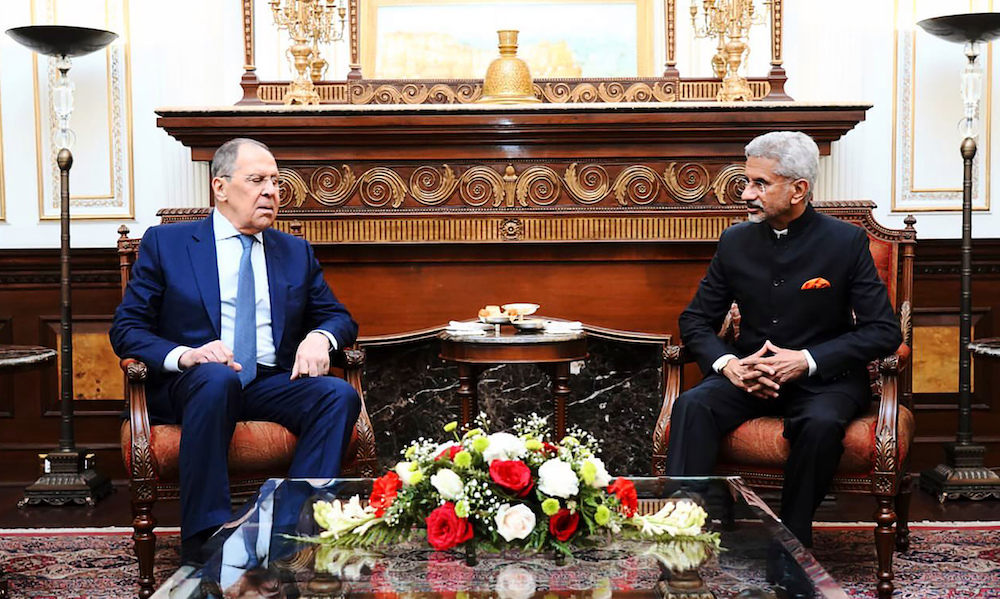NEW DELHI: India’s Foreign Minister Subrahmanyam Jaishankar called for an end to the violence in Ukraine, and respect for the UN Charter, during a meeting with his Russian counterpart Sergei Lavrov in New Delhi on Friday.
Lavrov arrived in India for a two-day visit on Thursday, after meeting Chinese leaders earlier this week.
Moscow has tried to keep the two Asian powers onside since the beginning of its invasion of Ukraine in late February, after Western countries imposed a slew of major sanctions on Russia. Both India and China have so far abstained from UN resolutions condemning the invasion.
During his meeting with Lavrov, Jaishankar “emphasized the importance of (the) cessation of violence and ending hostilities” in reference to the situation in Ukraine.
“Differences and disputes should be resolved through dialogue and diplomacy, and by respect for international law, (the) UN Charter, sovereignty and (the) territorial integrity of states,” Jaishankar’s office quoted him as having said.
While Russia is trying to shore up international support, India is facing mounting pressure to condemn it. Western envoys, including US Deputy National Security Adviser Daleep Singh and UK Foreign Secretary Liz Truss, flew to New Delhi prior to Lavrov’s visit to press India for tougher action against Moscow.
“Russia is desperate for legitimacy, so there’s no question at all that’s what this visit is about,” Dr. Radha Kumar, policy analyst and chair of the UN University Council, told Arab News.
“The government of India is at the same time talking to the Americans, to the Europeans, to the British, to Quad partners,” she said, referring to a four-state strategic security dialogue comprising India, the US, Japan and Australia.
Kumar added that Jaishankar’s emphasis on ceasing hostilities and respecting the UN Charter during his meeting with Lavrov was “definitely a rebuke,” but that condemning Russia was not on the agenda.
“Clearly, they are trying to say we are ready to hear everybody, we are absolutely with the international community when it comes to saying the war must end, and that there should be negotiations, however, we are not willing to take that further step of condemning Russia or isolating it,” she said.
With over half of India’s military hardware coming from Russia, New Delhi’s dependence on Moscow for defense equipment plays a part in the equation, but according to Pranay Kotasthane, deputy director at Bangalore-based think tank the Takshashila Institution, the more prominent factor is balancing the position of China.
“Indian foreign policy is aimed towards addressing the challenge of China,” he told Arab News. “In India’s calculation, it is thought that Russia can be an instrument to manage the China threat.”
Indian-Chinese ties have significantly deteriorated since April 2020, when tensions on their border in the northern Himalayan region of Ladakh led to a continuing standoff and the deployment of tens of thousands of extra troops to the area.
“Instead of cutting ties with Russia altogether, the Indian establishment thinks that, by continuing engagement with Russia, there might be a way in which you can prevent Russia from completely going along with China,” Kotasthane said. “The ideal situation for India is to have a relationship with Russia, so that Russia and China don’t get too close together.”
Despite this, Lavrov’s visit may not change much in India’s approach towards the invasion of Ukraine.
“India has in fact taken a neutral position vis-a-vis the West, vis-a-vis Ukraine, vis-a-vis Russia, and has called for a quick end to the conflict and quick end to the humanitarian crisis,” said Nandan Unnikrishnan, distinguished fellow at the New Delhi-based Observer Research Foundation.
“I think this is not a binary choice that we have to be either with the West or against the West, or against Russia or with Russia against the West. There is no such binary choice in front of India. India is going to make choices according to its national interest, and abstaining or not taking a position on a particular thing is also actually a very conscious choice.”




